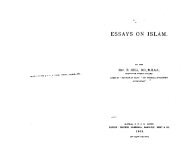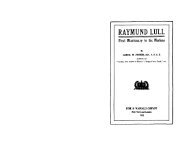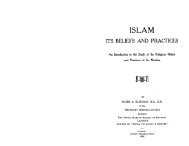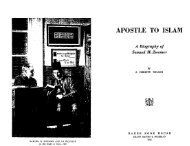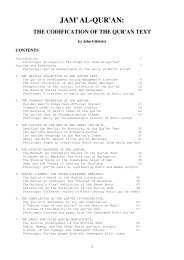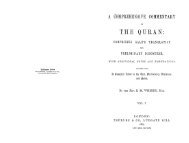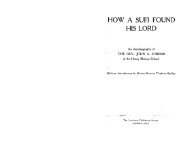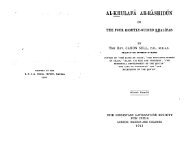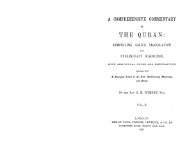Guillaume--Life of Muhammad.pdf - Radical Truth
Guillaume--Life of Muhammad.pdf - Radical Truth
Guillaume--Life of Muhammad.pdf - Radical Truth
You also want an ePaper? Increase the reach of your titles
YUMPU automatically turns print PDFs into web optimized ePapers that Google loves.
XV1ll<br />
The <strong>Life</strong> <strong>of</strong> <strong>Muhammad</strong><br />
and darkness. Then He separated them and made the darkness night,<br />
black exceeding dark; and He made the light day, bright and luminous." ,<br />
From this it is clear that 'Genesis' is the meaning <strong>of</strong> the title <strong>of</strong> the first<br />
section <strong>of</strong> the book. 1.H. skipped all the intervening pages and began with<br />
Abraham, the presumed ancestor <strong>of</strong> <strong>Muhammad</strong>. AI-Azraqi quotes some<br />
passages from the missing section in his Akhbiir Mecca and a few extracts<br />
are given by al-Mu(ahhar b. Tahir.'<br />
The Mubtada' in so far as it lies outside I.H.'s recension is not our<br />
concern, though it is to be hoped that one day a scholar will collect and<br />
publish a text <strong>of</strong> it from the sources that survive so that I.I.'s work ~an be<br />
read in its entirety as its importance warrants. In thIS sectIOn I.I. relted on<br />
Jewish and Christian informants and on the book <strong>of</strong> Abu 'Abdullah Wahb<br />
b. Munabbih (3~IlO or Il4) known as K. al-Mubtada' and also al-Isrii'<br />
iliyiit <strong>of</strong> which the original title was Qi~a~u'I-Anbiya'. To him he o~ed<br />
the history <strong>of</strong> the past from Adam to Jesus' and also the South Arabran<br />
legends, some <strong>of</strong> which 1.H. has retained. This man also wrote a maghiizi<br />
book and a fragment <strong>of</strong> it has survived. 3 1.1. cites him by name only once.'<br />
, h '<br />
It is natural that a book about <strong>Muhammad</strong>, 'the seal <strong>of</strong> the prop ets,<br />
should give an account <strong>of</strong> the history <strong>of</strong> th!O early prophets, .but the<br />
history, or legends, <strong>of</strong> South Arabia demand another explanatIOn. As<br />
Goldziher showed long ago,S it was in the second half <strong>of</strong> the first century<br />
that the antagonism <strong>of</strong> north and south, i.e. Quraysh and th: An~ar <strong>of</strong><br />
Medina first showed itself in literature. The An~ar, proud <strong>of</strong>theIr southern<br />
origin a~d <strong>of</strong> their support <strong>of</strong> the prophet when the Quraysh rej,ected him,<br />
smarted under the injustice <strong>of</strong> their rulers and the northern~r s clal~ to<br />
superiority. One <strong>of</strong> the ways in which their resentment mamfested Itself<br />
was in the glorification <strong>of</strong> I;limyar's great past. 1.1. as a loyal son <strong>of</strong><br />
Medina shared the feelings <strong>of</strong> his patrons and recounted the achIevements<br />
<strong>of</strong> their forefathers, and 1.H., himself <strong>of</strong> southern descent, retained in the<br />
Sira as much <strong>of</strong> the original work as he thought desirable. To this accident<br />
that I.H. was a I:Jimyari we owe the extracts from stories ~f the old South<br />
Arabian kings. 1.H. devoted a separate book to the subject, the K. al-<br />
Tijan li-ma'rifati muliiki I-zaman (fi akhbari Qal;tan)." . .<br />
The second section <strong>of</strong> the book whIch IS <strong>of</strong>ten called al-Mab ath beglll s<br />
with the birth <strong>of</strong> the prophet and ends when the first fighting from his base<br />
in Medina takes place. The impression one gets from thIS sectlO~ IS <strong>of</strong><br />
hazy memories; the stories have lost their freshness and have_ ~othI~g <strong>of</strong><br />
that vivid and sometimes dramatic detail which make the maghazl stonesespecially<br />
in al-Waqidi-so full <strong>of</strong> interest and excitement. Thus while the<br />
Mcdinan period is well documented, and events there are c~ronologIcally<br />
a!."ranged, no such accuracy, indeed no such attempt at It, can be<br />
1 ed. and tr. CI. Huart, Publ. de ticole des lang. or. viv., s. iv, vol. xvi, i-vi, Paris, 1899-<br />
19 19. .<br />
1. A summary <strong>of</strong> the contents is given in T. 1.<br />
3 See E.!. 4 p. 20.<br />
5 M.S. i. 89-()8. 6 Haydarabad. 134 2 .<br />
claimed for the Meccan period. We do not know <strong>Muhammad</strong>'s age when<br />
he first came forth publicly as a religious reformer: some say he was forty,<br />
others say forty-five; we do not know his precise relation to the Banu<br />
Najjar; the poverty <strong>of</strong> his childhood ill fits the assertion that he belonged<br />
to the principal family in Mecca. The story <strong>of</strong> those years is filled out with<br />
legends and stories <strong>of</strong> miraculous events which inevitably undermine the<br />
modern reader's confidence in the history <strong>of</strong> this period as a whole. In<br />
this section particularly, though not exclusively, 1.1. writes historical<br />
introductions to his paragraphs. A good example is his foreword to the<br />
account <strong>of</strong> the persecution the prophet endured at the hands <strong>of</strong> the<br />
Meccans: 'When the Quraysh became distressed by the trouble caused by<br />
the enmity between them and the apostle and those <strong>of</strong> their people who<br />
accepted his teaching, they stirred up against him foolish fellows who called<br />
him a liar, insulted him, and accused him <strong>of</strong> being a poet, a sorcerer, a<br />
diviner, and <strong>of</strong> being possessed. However the apostle continued to proclaim<br />
what God had ordered him to proclaim, concealing nothing, and<br />
exciting their dislike by comemning their religion, forsaking their idols,<br />
and leaving them to their unbelief'. I This is not a statement resting on<br />
tradition, but a concise summary <strong>of</strong> the circumstances that are plainly<br />
indicated by certain passages <strong>of</strong> the Quran which deal with this period.<br />
Of the Maghazi history little need be said. For the most part the stories<br />
rest on the account <strong>of</strong> eyewitnesses and have every right to be regarded as<br />
trustworthy.<br />
Characteristics<br />
Introduction<br />
The opinions <strong>of</strong> Muslim critics on I.I.'s trustworthiness deserve a special<br />
paragraph; but here something may be said <strong>of</strong> the author's caution and his<br />
fairness. A word that very frequently precedes a statement is za'ama or<br />
za'amii, 'he (they) alleged'. It carries with it more than a hint that the<br />
statement may not be true, though on the other hand it may be sound.<br />
Thus there are fourteen or more occurrences <strong>of</strong> the caveat from p. 87 to<br />
'48 alone, besides a frequent note that only God knows whether a particular<br />
statement is true or riot. Another indication <strong>of</strong> reserve if not scepticism<br />
underlies the expression Ii rna dhukira ii, as in the story <strong>of</strong> the jinn<br />
who listened to <strong>Muhammad</strong> as he prayed; <strong>Muhammad</strong>'s order to 'Umar<br />
to kill Sllwayd; one <strong>of</strong> Gabriel's visits to <strong>Muhammad</strong>; the reward <strong>of</strong> two<br />
martyrs to the man killed by a woman.' An expression <strong>of</strong> similar import is<br />
fi mil balaghani. 3<br />
Very seldom does 1.1. make any comment <strong>of</strong> his own on the traditions<br />
he records apart from the mental reservation implied in these terms.<br />
Therefore when he does express an opinion it is the more significant.<br />
In his account <strong>of</strong> the night journey to Jerusalem and the ascent into heaven<br />
1 p. 183; see also 187. 230 et passim. 1. pp. 281, 356, 357. 308.<br />
3 pp. 232• 235 et passim. Extreme caution introduces the legends <strong>of</strong> the light at the<br />
prophet's birth. 102.<br />
xix



